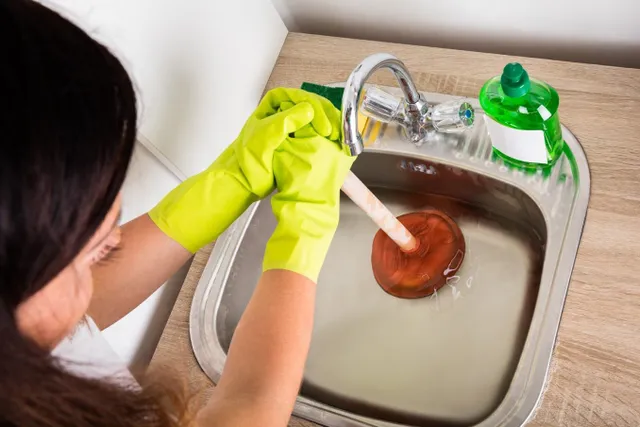Clogged drains are a real pain that can repeatedly frustrate homeowners for many reasons. The best way to deal with a clogged drain is to prevent it from being clogged. Unfortunately, many people are unaware of some of the most common causes of clogged drains and continue to endanger their drains with their repeated bad habits.
Let’s take a closer look at 10 common causes of clogged drains that might cause you to hire a plumber to do a household drain cleaning service.
1. Grease
Pouring fat, oil, or grease into the drain for your kitchen sink is a lot like putting cholesterol in your arteries. The grease will become semi-solid, stick to the insides of the drains and drainage pipes, and might block sewage pipes. The more grease that you put into your sink, the more restricted the water flow becomes until you have a clogged sink. Meanwhile, the grease could start to decompose and great a foul odor. Fortunately, you could use dish soap that contains a degreaser or a dedicated drain cleaner that is safe to use to break up grease and flush it from your drains.
2. Flour
Flour is another seemingly harmless substance that you might be tempted to wash down a drain – especially if there is relatively little of it. That is a bad idea because flour coagulates when mixed with water. That coagulated flour could stick to the sides of the drain pipe and create a clog that prevents any drainage. You should wipe up flour with a paper towel and dispose of it in the trash.
3. Eggshells
If you have a garbage disposal in your sink, you might be tempted to use it to get rid of eggshells. That is a bad idea because the shells can break up into tiny pieces that lodge themselves inside the garbage disposal and eventually block water flow. You might notice the water is draining more slowly and the disposal is giving off a bad smell. That is a sign that you are putting things in it that it cannot process – like eggshells.
4. Coffee Grounds
If you enjoy a hot cup of coffee in the morning, there is a good chance that you brew your own coffee. After you pour your coffee and empty the pot, you need to dispose of them by putting the coffee grounds in the trash. Unfortunately, many people wash them into the sink drain or the garbage disposal, which is how many of them wind up clogged. The coffee grounds are very tiny, but they also are solid and survived being saturated with boiling hot water. So they can survive a simple run into the drain and collect in any grease or coagulants inside your drain.
5. Medication
It might seem odd, but many people dispose of medication by either flushing it or placing it in the sink. They might try to crush pills or pour liquid medication into the drains to make it easier for water to wash it away. Unfortunately, the medication can survive that journey and wind up in local water supplies. Recent testing has shown fish contaminated with prescription drugs in Florida’s coastal waters. Those waters are part of a very large ocean, but fish still get contaminated, which shows how easy it is to contaminate a local water supply system.
6. Kitty Litter
You aren’t likely to dispose of kitty litter in a sink, but many people flush it in their toilets. That is a mistake, especially if it is clumping cat litter. The litter can coagulate in the water and create a muddy substance that gathers inside the plumbing and causes the water to back up. A backed-up toilet can be a very unpleasant experience that is best avoided by not flushing kitty litter of any kind.
Those are some of the more common sources of clogged drains, but many others exist. If you cannot fix the problem with a plunger or a drain snake, you should contact a local plumbing service and stop putting items in drains that restrict water flow.

